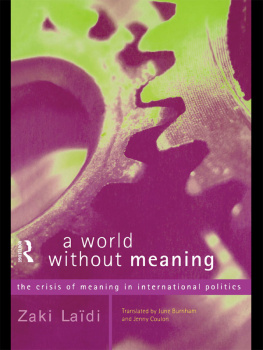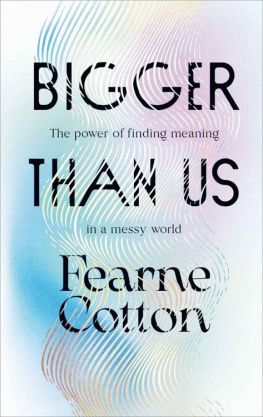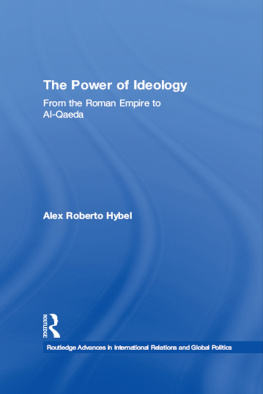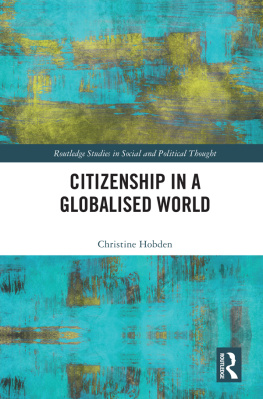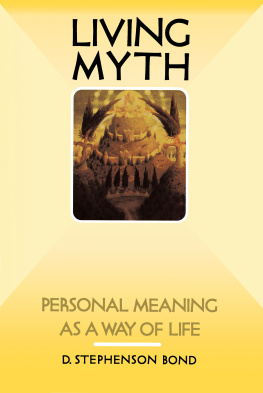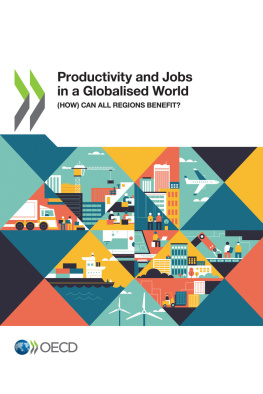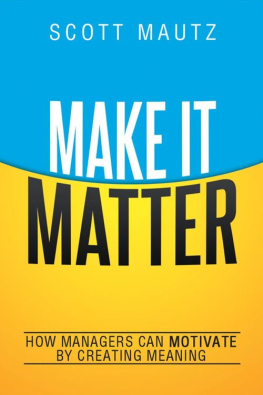A world without meaning
A World Without Meaning has been a major influence in French thinking about the wider impacts of globalisation on international relations. Particularly, it is a book that analyses the importance of the postmodern sentiment as a salient factor in international relations. Its translation into English is timely, and important.
Richard Higgort, Director, Centre for the Study of Globalisation and Regionalisation, University of Warwick
The end of the Cold War marked not only the end of communism but also the end of a way of thinking dating from the Enlightenment. With the emergence of a globalized world order, it has become increasingly difficult for us to make sense of the world we live in.
In this provocative and incisive book, Zaki Ladi argues that as our world becomes ever larger, our ability to find meaning in it diminishes. With the end of communism came the end of the intimate alliance between power and ideology. No power in our globalized world can any longer claim to provide meaning. In despair we look back to old models (religious traditions, nationalism, ethnicity) to give us a sense of identity. But how effective are these old certainties in a globalized world in a permanent state of flux?
Zaki Ladi is a Research Fellow at the Centre dEtudes et de Recherches Internationales, and Professor at the Institut dEtudes Politiques in Paris.
A World Without Meaning
The crisis of meaning in international politics
Zaki Ladi
Translated by June Burnham and Jenny Coulon
First published in English 1998
by Routledge
11 New Fetter Lane, London EC4P 4EE
This edition published in the Taylor & Francis e-Library, 2005.
To purchase your own copy of this or any of Taylor & Francis or Routledges collection of thousands of eBooks please go to www.eBookstore.tandf.co.uk.
Simultaneously published in the USA and Canada
by Routledge
29 West 35th Street, New York, NY 10001
Un monde priv de sens Librairie Arthme Fayard 1994
This edition Routledge 1998
This book is supported by the French Ministry for Foreign Affairs, as part of the Burgess Programme headed for the French Embassy in London by the Institut Franais du Royaume-Uni.
All rights reserved. No part of this book may be reprinted or reproduced or utilised in any form or by any electronic, mechanical, or other means, now known or hereafter invented, including photocopying and recording, or in any information storage or retrieval system, without permission in writing from the publishers.
British Library Cataloguing in Publication Data
A catalogue record for this book is available from the British Library
Library of Congress Cataloging in Publication Data
Ladi, Zaki
[Monde priv de sens. English]
A world without meaning: the crisis of meaning in international politics/Zaki Ladi: translated by June Burnham and Jennny Coulon.
p. cm.
Includes bibliographical references and index.
ISBN 0-415-16717-5
(hbk: alk. paper)ISBN 0-415-16718-3 (pbk: alk. paper)
1. World politics1989 2. Civilization, Modern1950
I. Title
D860.L3513 1998 982515
CIP
ISBN 0-203-98193-6 Master e-book
ISBN ISBN 0-415-16717-5 (hbk)
ISBN 0-415-16718-3 (pbk)
Does everything really have meaning? Arent there some empty spaces remaining, whose emptiness is perhaps their only meaning? Isnt there a gap there, a hole, between the image produced and the meaning it supplies or dissimulates?
Paul Zumthor, La mesure du monde (Paris: Le Seuil 1993), p. 15
Preface
Itinerary
It is not original to say that the end of the Cold War has profoundly modified our view of the world. Nevertheless, the banality of this statement does not reduce the personal intensity of the feeling for someone who has chosen to organize his intellectual trajectory around the theme of globalization and the issues surrounding it. The East-West conflict has long constituted a real obstacle for me, confining me almost by default to something I knew less badly: North-South relationships. The end of the Cold War freed me too, in a certain way. It helped me to formulate much larger questions about the meaning of the world and by that route to gain easier access to certain territories with which I had had only weak links until then, either culturally (Asia) or intellectually (Europe). It is to intellectual, personal liberation that this book is dedicated.
In my efforts I have benefited for more than ten years from the thoughts and the role models of people as diverse as Jean-Franois Bayart, Pierre Hassner, Guy Hermet and Jean Leca. They have, each in their own way, given me a taste for the open seas. I have also derived immense profit from exchanges with most of my colleagues or visitors at the Centre dEtudes et de Recherches Internationales (CERI), who have been kind enough to participate regularly in the multidisciplinary seminars on international relations I have organized since 1990. They are too numerous to mention by name, but they will easily be able to recognize themselves. I also owe much to all the Temps Mondial team which, thanks to its indulgence, allowed me to get to know foreign territories and issues, to temper my natural but immoderate tendency to globalize my arguments and analy ses.
Finally I must acknowledge my debt to Rachel Bouyssou, a special but exacting reader of this manuscript, as well as all the administrative team at CERI who know the affection I have for them.
Do I need to add that, without the inestimable faith of Claude Durand, this book would have never seen the light of day?
Paris-Vandoeuvres
Introduction
The divorce of meaning and power
The end of the Cold War did not bury just communism. With the same enthusiasm and in the same spirit it buried two centuries of Enlightenment, two centuries of which in the end the Cold War constituted only its most intense historic period, its most vigorous geostrategic expression and its most complete ideological form. Our feeling of an exceptionally strong change in world order after the fall of the Berlin Wall is coupled with our equally enormous inability to interpret it, to give it meaning. Though all the upheavals we experience daily can have several meanings, nothing indicates they have a meaning, if by meaning we imply the triple notion of foundation, unity and final goal: foundation meaning the basic principle on which a collective project depends; unity meaning that world images are collected into a coherent plan of the whole; and end or final goal, meaning projection towards an elsewhere that is deemed to be better. With the end of the Cold War these three principles were dislocated from each other. Market democracy apparently triumphed, yet seems itself more incapable than ever of defending the debate over its foundation. Political, economic and financial disorders fit less and less readily into a common explanatory framework, though they have never been so interdependent. Finally, the need to project ourselves into the future has never been so strong, while we have never been so poorly armed on the conceptual front to conceive this future, which leaves a wide gap between the historic rupture that confronts us and our difficulty in interpreting it. These gaps are at the origin of the world crisis of meaning. It is to the damaging divorce they cause between the play of meaning and the play of power that this book is dedicated.

